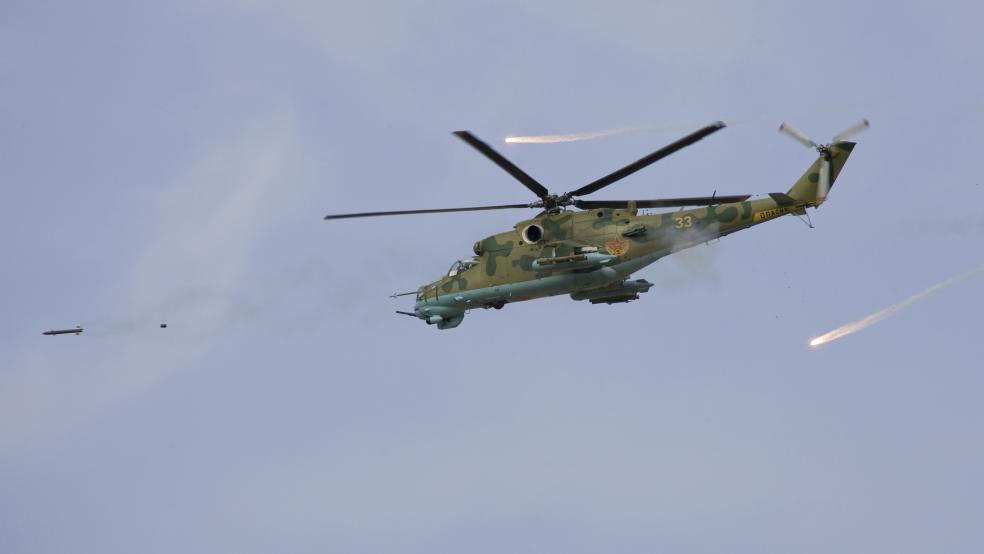What a week for President Obama and his toe-in-the-water strategy to stabilize the riotous anarchy that is Syria. The administration can do all the papering over they wish, but there’s no obscuring the truth that just landed with a thud: In the seventh of Obama’s eight years in office, we’re staring at abject policy failure—and it extends beyond Syria to Iraq and Afghanistan.
It’s somewhere between ironic and perfectly predictable that this news was delivered by Vladimir Putin—Obama having spent the past several years fashioning the Russian president as America’s archenemy. Since Moscow began moving materiel into Syria—and, as of Wednesday, started bombing runs—it’s just too obvious that the initiative in Syria has slipped from this administration’s grip.
Related: Why Trump Is Putin’s Favorite Presidential Candidate
In their much-anticipated encounter at the U.N. last week, Putin presented a strategy to defeat the Islamic State that is clear, decisive, and—like it or not—right. In other words, a strategy that is everything the Obama administration’s isn’t.
Putin’s plans aren’t too complicated. One, it’s time to go beyond bombing, for that alone will not do the job: The U.S. record over the past year and a half is painful proof of this. Two, he urges Washington to join a united front against the Islamic State, setting aside all differences in the mold of the World War II alliance. Once ISIS falls, a transition to a post-Assad government in Damascus can be negotiated.
Over the weekend a source in Moscow well-wired into Kremlin circles explained the thinking behind this sequence. “Putin came back from New York convinced that the U.S., left to its present course, is going to turn Syria into another Libya,” this source wrote.
The record supports this position, regrettably. Remove Bashar al-Assad first and you’re copying the removal of Saddam Hussein in Iraq and the bombing of the Qaddafi government out of existence in 2011.
Related: The Real Reason Putin Wants to Keep Assad in Power
But the record also indicates that Washington isn’t ready to take Step 1 toward a realistic solution in Syria—that is, to begin seeing this crisis as something far greater than the usual geopolitical chess, as if it’s “all about us” and sustaining American primacy.
“The meeting with Obama in New York did not go well,” the Moscow source writes in explaining the Kremlin’s view. “Putin had expected a broader agreement to work together, but Obama did not engage…. He didn’t seize the opportunity to engage the battle in a coordinated way.”
The White House and the journalists sympathetic to this administration’s foreign policy thinking have since put more spin on Moscow’s newly activist position in Syria than Mattel ever put on a top: Putin’s “on the ropes,” he’ll make Syria more violent, Russia’s not going after ISIS, it’ll be Russia’s second Afghanistan, Putin will be the target of terrorists everywhere, the Russian planes are old and may crash, nothing can work so long as Assad’s in power.
Charles Krauthammer wrote in The Washington Post, a day after Russian warplanes began bombing runs in Syria, “If it had the wit, the Obama administration would be not angered, but appropriately humiliated. President Obama has, once again, been totally outmaneuvered by Vladimir Putin.”
Related: 13 Deadly Weapons Russia Has Sent to Syria
That’s more like it. So was Peggy Noonan in the next day’s Wall Street Journal, “The week’s biggest failure was… of course, Russia’s going full bore into Syria…. The Obama administration didn’t ‘act,’ really. They scrambled, desperately, stung by surprise and humiliation.”
I mentioned realities the Obama administration can’t or won’t accept. For the moment I count five:
• The united front Putin urged on Obama is up and running as we speak. A week ago the Iraqi military command announced that Baghdad would begin sharing intelligence in the fight against ISIS with Tehran, Moscow, and Damascus. Once again, the White House was left “scrambling,” as a report in The New York Times put it.
• Washington complains that Russian bombers aren’t hitting ISIS. But the stated mission is to keep Assad from falling, and the targets appear to be those most directly threatening Damascus. Is there a surprise here? Equally, should Moscow discriminate against one group of Islamists from another, given that “moderates” in this war long ago proved a figment of the CIA’s ever-fertile imagination?
• Russia may well reassert influence in the Middle East that the Soviet Union lost, but this begs two questions. One, whose failures opened this door? Two, is “multi-polarity” nothing more than a long word, or is it an inevitable feature of the 21st century?
• The collapse of Obama’s minimalist policies now comes in two parts. As The Times reported Sunday, efforts to train and arm local forces to fight causes Washington favors but won’t defend with troops come to a 15-year-record of failure across the Middle East. And there can’t be any grimmer indictment of Obama’s bombs-and-drones strategy than the tragic destruction of a hospital in Kanduz, Afghanistan on Saturday. The civilian casualties attaching to this policy can’t be accepted any longer.
• Last and largest, even Hillary Clinton is now openly at odds with the White House, so the assessment of failure is not a party-line question. But a more vigorous response, as almost everyone now urges, doesn’t promise a solution.
That lies in a politically sophisticated use of assets, and these now include Moscow’s new material commitment on Syrian soil and the (unexplored) potential for cooperation with Iran arising out of the recently concluded nuclear accord.
As of last week all the pieces are in place for a solution in Syria, except one: Washington’s capacity to accept the bitter realities attaching to more or less complete strategic failure.






